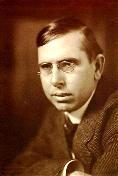Skip to: site menu | section menu | main content
Welcome To Democracy And Socialism .Com
Things should be made as simple as possible, but not any simpler- Albert Einstein
Theodore Dreiser (1871 – 1945) |
 |
Theodore Dreiser was one of the most notable writers, political and social activists of the twentieth century in the U. S.
He was ninth of ten surviving children of a poor Indiana family. His childhood was plagued with misery and unhappiness, which had a great role in shaping the many characters he created in his naturalist-realistic novels.
In 1900, his famous novel, Sister Carrie was published, but it received much more attention two years later. His second novel, Jennie Gerhardt, was published in 1911; after that period his subsequent novels mostly dealt with social injustice and economic inequalities.
In An American Tragedy (1925), which was based on a real story, he disgraced the American Dream. This novel was filmed twice in 1931 and 1951.
As a social and political activist, he was involved in campaigns against the brutal murder of unionist and anti-war activist Frank Little (1917), the false conviction of trade union leader Tom Mooney (1918), the Sacco and Vanzetti case, who were framed, convicted and electrocuted in1927 and the deportation of Emma Goldman and others in 1919.
As a guest of the government he visited the Soviet Union and wrote his perceptions: Dreiser Looks at Russia (1928). Dreiser was critical of the way socialism was heading in the Soviet Union, but as a committed socialist he finally joined the American Communist Party in August 1945. In a public statement he describes his reason for joining the Party: “Belief in the greatness and dignity of Man has been the guiding principle of my life and my work. …” He died four months later in Hollywood at the age of seventy-four.
His other works:
-
The Financier, 1912
-
The Titan, 1914
-
The Genius, 1915
-
A Hosier Holiday, 1916
-
Plays of the Natural and Supernatural, 1916
-
Free and Other Stories, 1918
-
The Hand of the Potter, 1918
-
Twelve Men, 1919
-
Hey-Rub-A-Dub-Dub, 1920
-
A Book about Myself, 1922
-
The Colour of a Great City, 1923
-
Mood, Cadenced and Declaimed, 1926
-
Chains, 1927
-
A Gallery of Women, 1929
-
Epitaph, 1929
-
My City, 1929
-
Dawn, 1931
-
Tragic America, 1931
-
Living Thoughts of Thoreau, 1939
-
America is Worth Saving, 1941
-
The Bulwark (published posthumously, 1946)
-
The Stoic (published posthumously, 1947)